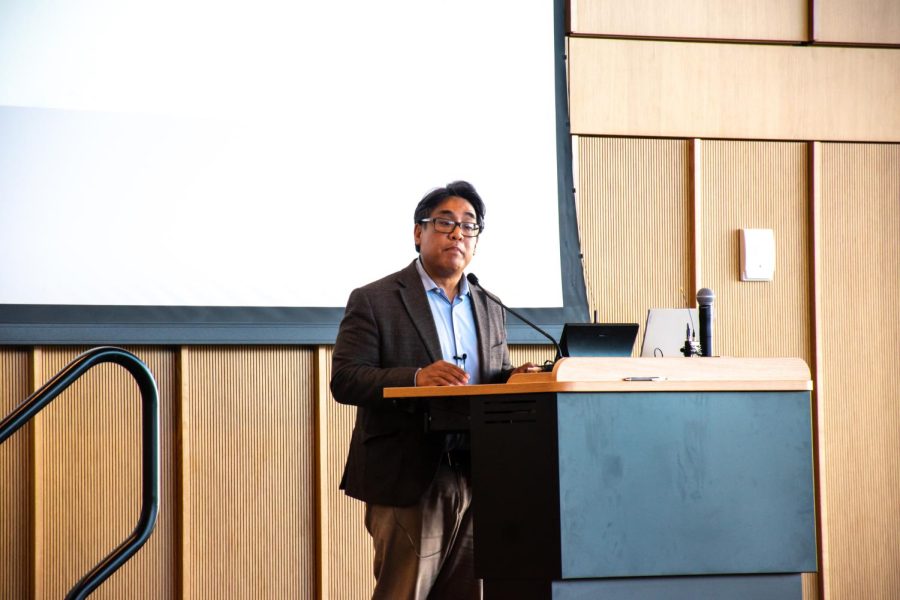Democracy sustains itself with mini-revolutions.
On Wednesday, as students huddled to shake hands and swap brief repartee with plenary lecturer Cedric de Leon, this was the expression the sociologist strung together to characterize the insurgent rise of a younger, more diverse and less entrenched generation of labor union leaders.
The Massachusetts Teachers Association, he used as an example, began its “mini-revolution” for a more deliberative and democratic labor union almost 10 years ago, and it succeeded, recasting its former leaders with rank-and-file union members led by a group called Educators for a Democratic Union.
“Community by community, they defeated them, just washed them right out of power. And I think that’s the only way, unless the leadership actually listens to the membership,” said de Leon, who teaches sociology and labor studies at the University of Massachusetts.
Since his work as a young researcher for the Connecticut School Bus Drivers Alliance and United Farm Workers, de Leon has witnessed a turning tide within labor movements transforming them from “predominantly white mafias” into representative democracies.
This modern resurgence of the American labor movement is representative of what de Leon in his plenary lecture “Black Souls or Black Labor?” calls “A Du Boisian Vision for the U.S. Labor Movement,” a vision of workplace democracies led by a vanguard of Black workers and workers of color who seized their own liberation.
“The pared-down, fortune-cookie version of W.E.B. Du Bois decontextualized [The Souls of Black Folk] from the broader way he visualized Black people, which was not about individuals but systems, not about psychology but sociology,” de Leon said, referring to Du Bois’ seminal literary work.
He continued, “Black Folk have souls, but they were also brutalized and commodified labor in the wider context of racialized capitalism.”
After a lengthy chronology of Du Bois’ education and his celebrated career as a sociologist, delivered by an audiobook narrator, de Leon prompted his audience to reflect on their own revolutionary potential.
Du Bois spent several years as a child living in Great Barrington, a town located an hour west of UMass, where, sitting yards away from a library named after Du Bois, students filled seats in the Student Union ballroom at a lecture dedicated to covering his life’s work. The inspiring irony was not lost on de Leon.
“In western Massachusetts at the age of 16, Du Bois witnessed the problems of our economic system and devoted his life to changing it,” he said. “What will you do in western Massachusetts in the flower of your youth?”
De Leon’s lecture is the 2022 installment of the Commonwealth Honors College Plenary Lecture series, an annual speech given by a UMass faculty member aimed at CHC students but open to members of the public.
The plenary address invites the University’s most intrepid researchers and respected professors to share ideas that, by CHC Dean Mari Castañeda’s appraisal, speak to the day’s most salient social issues and have the potential to spur discussion in the Honors College’s Ideas That Change the World class.
Last fall, professor Martín Espada, a poet housed in the English department, regaled a captive audience with excerpts from his latest book “Floaters” in a lecture titled “The Poetry of Social Justice.” Previous plenary lecturers have presented on numerous other subjects ranging from racism in science to a biography of two 18th century slaves, Lucy Terry and Abijah Prince.
De Leon was chosen because of his “expertise in the labor movement and his perspective on Du Bois bringing race into labor and capital. He’s also just a beautiful speaker, and I felt that he could bring the intellectual engagement of thinking through these ideas and doing them for a relevant present,” Castañeda said.
In his lecture, the professor painted a portrait of a relevant present that isn’t all that dissimilar from the political landscape of Du Bois’s time, drawing comparisons between the civil rights movement of the 1960s and the tide of Black Lives Matter protests that swept the nation in the summer of 2020.
“Many white working class men embrace the value of labor solidarity across racial lines, but too many still harken to the siren call of white supremacy,” he added.
Du Bois was born in Massachusetts three years after the end of the Civil War. His first brush with the Jim Crow south, the grit of abject poverty in Tennessee and brazen racism of segregation, cemented his identity as something decidedly apart from a blind patriot.
“Into this world I leapt with enthusiasm. A new loyalty and allegiance replace my Americanism: henceforth I was a Negro,” he wrote about his time in Nashville.
De Leon shares a similar trajectory with the subject of his talk — a Toronto native from an immigrant family, de Leon was a Yale undergraduate student looking to become a “rich and powerful” corporate lawyer when he first began labor organizing as a means to pad his resume.
Inadvertently, de Leon said he “rediscovered the working class people of color who I was told I needed to escape, and I realized I loved being around my people better.” He now melds organizing and academia teaching courses on social theory, the American labor movement, race, gender and labor, and political sociology.
Much like his hope that his middle school-aged son, who sat front row at his lecture, will continue to feel confident “advocating for himself and insisting on being part of the conversation,” de Leon said. He hopes for a generation of young people who can rise to the challenge of Du Bois’ vision for the American labor movement, one that is vibrant and democratic from the bottom up.
“We met here together in the long years to come, still shrouded in darkness, perhaps the darkness before the dawn,” he said. “My question to our students is this: can you make the morning come?”
Rebeca Pereira can be reached at [email protected].


















